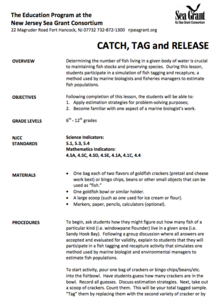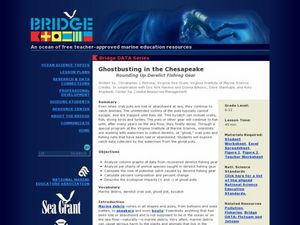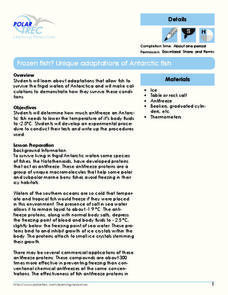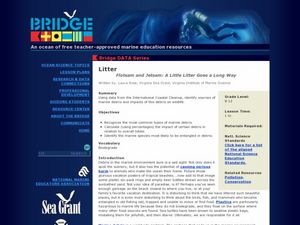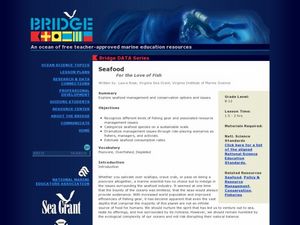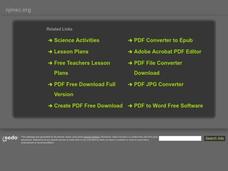Curated OER
Fishes Concept Map
For this marine science worksheet, students complete a concept map on the different types of fish. They fill in 8 blanks with the correct answer from the word list.
Curated OER
Catch, Tag, and Release
Learners discover how fish tagging is used by marine biologists and fisheries to estimate fish populations. Participating in a simulation, students use estimation to determine the whole population from a small number of items.
Curated OER
Rescue at Sea
Students examine stereotypes that they may have regarding scientists. They read and discuss 'Scientist at Work: High Seas Hunter Pleads for Preservation of Fish' and reflect on the work of a Marine Conservationist.
American Museum of Natural History
They Glow!
Would you believe marine animals can make their own light? An online resource describes the process of bioluminescence and how animals in the ocean use it to survive. The lesson features a catchy tune that describes the behavior of ocean...
Curated OER
Classifying Commercial Marine Species
Students investigate taxonomy. They explore some of the commercial marine species caught in Magdalena Bay and develop a classification system for presented animals.
Curated OER
Ghostbusting in the Chesapeake
Ghost pots, fishing gear lost during crabbing expeditions, continue to trap crabs that are never collected. Increase your budding ecologists' awareness of human impact on the environment as well as conservation efforts using this...
American Museum of Natural History
Ocean Creature Feature
From coloring to hard protective shells, ocean creatures have adaptation features that help them survive. An eight-question online quiz highlights different ocean animals and their unique characteristics. The resource then offers pop-up...
Curated OER
The Dead Zone: A Marine Horror Story
Students graph dissolved oxygen versus depth using data taken from NECOP Program. In this marine science activity, students explain the causes of hypoxia. They recommend possible solutions to this problem.
American Museum of Natural History
Journey to the Bottom of the Sea
Follow the path to the sea floor. Pupils play an online interactive board game to reach the bottom of the sea. Participants must match descriptions of creatures to a property of water dealing with oxygen, food, light, or density to move...
American Museum of Natural History
They Glow!
Let there be light! An interactive online lesson describes the process of bioluminescence and how ocean species use it to their advantage. The lesson highlights several specific species as well as provides vocabulary support with...
Polar Trec
Frozen Fish? Unique Adaptations of Antarctic Fish
Some fish contain proteins that act like antifreeze in order for them to live in the frigid waters of Antarctica! High schoolers determine how much antifreeze a fish needs to lower its body temp to -2.5 degrees. Teachers act as a...
Curated OER
How Harmful Is It?
Students complete a form that requires them to make decisions about how severely different types of marine debris affect people, animals, vessels, communities. Results are totaled and analyzed to determine which types of marine debris...
Curated OER
Sea Connections: Marine Ecosystems
Students identify producers and consumers from marine ecosystems and describe the balance among them in the environments. After constructing a food chain from a marine ecosystem, they examine human activities that can upset the balance...
Curated OER
Aquatic Roots
Young scientist use reference materials to research various local aquatic plants and or animals to find out whether they are natives or exotics. They investigate their impacts on people, other animals and the environment. Students...
Curated OER
The Sights and Sounds of Orcas
Students investigate the orca whale. They participate in an online Webquest, listen to whale vocalizations online, answer discussion questions, and locate and read newspaper articles on marine mammals and orca whales.
Curated OER
LitterFlotsam and Jetsam: A Little Litter Goes a Long Way
Young scholars explore the concept of environmental stewardship. In this science lesson, students investigate data from the International Coastal Cleanup, identify sources of marine debris, and discover the impacts of this debris on...
Curated OER
Chilean Sea Bass
Introduce your mini-marine biologists to using databases. Tables of how many Chilean Sea Bass were caught and number of hours spent fishing are examined. Using the data, individuals calculate the "Catch per Unit of Effort" for each year....
Curated OER
Seafood: For the Love of Fish
Students role play a scenario specific to decision making in seafood management and conservation. For this marine science lesson, students estimate seafood consumption in their state. They recommend new regulations for better fishery...
Curated OER
Creative Writing - I AM A FISH
Ninth graders write a letter to the editor about the impact of people on marine life from the point of view of a fish.
Curated OER
Classification and Identification
Students, after exploring and analyzing diagrammatic and taxonomic keys and their association to marine sciences, identify and classify objects and organisms based on visual attributes/characteristics. They research and create their own...
American Museum of Natural History
Find My Plankton Baby Picture
Get a better understanding of babies in the sea. The class learns about the two kinds of plankton. They then determine the baby pictures of eight marine animals given a picture of the adult and some hints about the larvae. When scholars...
Curated OER
Fishing For The Future
Students participate in a simulation using M&M's that highlights Garrett Hardin's concept of the "tragedy of the commons." They use the activities to study sustainability issues in the fishing industry.
Curated OER
Dirty Mud
Students examine geological information to study benthic marine habitats. In this watershed project, students examine wetland habitats and land uses in a watershed. They will use geological information to discuss the impact of pollution...
Scholastic
Study Jams! Aquatic Ecosystems
Mia's friends are fish-sitting while she is away on vacation. Zoe divulges to Sam that different animals need different habitats, and that there are both freshwater and saltwater ecosystems. Examples of the kinds of organisms found in...
Other popular searches
- Marine Fish Anatomy
- Marine Fish Osmoregulation
- Fish and Sea Creatures
- Marine Fish Diversity
- Marine Fish Powerpoints



